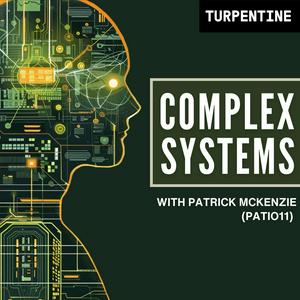75 odcinków
- Patrick McKenzie (patio11) sits down with Intercom co-founder Des Traynor to examine customer support through the lens of Conway's Law, Goodhart's Law, and several decades of accumulated organizational scar tissue. They discuss how AI agents are democratizing white-glove service, why modern LLMs have retrained user expectations around “chatbots” very quickly, and the surprisingly liberating effect of talking to something that will never judge you for missing a loan payment.
–
Full transcript available here: www.complexsystemspodcast.com/des-traynor/
–
Sponsor: MongoDB
Tired of database limitations and architectures that break when you scale? MongoDB is the database built for developers, by developers: ACID compliant, Enterprise-ready, and fluent in AI. Start building faster at mongodb.com/build
–
Timestamps:
(00:00) Intro
(00:29) Intercom and its evolution
(00:51) Challenges in customer service systems
(02:54) Scaling customer support in startups
(04:53) Organizational inefficiencies and customer experience
(06:53) Metrics and their impact on customer support
(12:40) Human capital issues in customer support
(15:53) AI's role in customer support
(17:01) Future of customer support roles
(20:09) Sponsor: MongoDB
(20:53) Future of customer support roles (continued)
(26:19) AI and customer interaction
(26:55) The myth of artisanal customer support
(27:45) Fin Guidance: Evolution and user behavior
(29:10) Fin's impact on customer support efficiency
(33:30) Expanding Fin's capabilities beyond support
(42:50) AI in government and other sectors
(49:20) The future of AI connectivity and integration - Patrick McKenzie (@patio11) reads his latest Bits about Money essay explaining why he “loves Regulation E more than any rational person does.” He explains how Reg E created a privately-administered legal system processing over 100 million complaints annually—dwarfing the formal U.S. court system—and why banks are now trying to avoid these obligations for Zelle's nine figure fraud problem.
–
Full transcript available here: www.complexsystemspodcast.com/the-magic-spell-reg-e/
–
Sponsors: MongoDB & Framer
Tired of database limitations and architectures that break when you scale? MongoDB is the database built for developers, by developers: ACID compliant, Enterprise-ready, and fluent in AI. Start building faster at mongodb.com/build
Building and maintaining marketing websites shouldn’t slow down your engineers. Framer gives design and marketing teams an all-in-one platform to ship landing pages, microsites, or full site redesigns instantly—without engineering bottlenecks. Get 30% off Framer Pro at framer.com/complexsystems.
–
Links:
Bits about Money, One Regulation E, Two Very Different Regimes
Full version of "Doesn't Matter, That's Reg E": https://suno.com/song/173bbd67-92f7-4868-930f-efeca4b373c0
–
Timestamps:
(00:00) Introduction
(02:46) These newfangled computers might steal our money
(12:45) The contractual liability waterfall in card payments
(20:35) Sponsors: MongoDB and Framer
(22:23) The contractual liability waterfall in card payments (continued)
(23:47) Enter Zelle
(25:46) Zelle is an enormous fraud target
(32:23) Banks may attempt to extend the Zelle precedent
(35:02) Reg E encompasses almost every technology which exists and many which don't yet - Our annual year-in-review episode covers some recurring themes from 2025 and some behind-the-curtains discussion of running a podcast. Patrick McKenzie (patio11) sits down with producer Sammy Cottrell to discuss the most popular episodes of the year, the impact of AI coding tools, the challenges of video podcasting, Sammy's role as a "fixer" finding guests, and much more.
–
Full transcript available here: www.complexsystemspodcast.com/2025-in-review-with-sammy-cottrell/
–
Sponsor:
Framer is a design and publishing platform that collapses the toolchain between wireframes and production-ready websites. Design, iterate, and publish in one workspace. Start free at framer.com/design with code COMPLEXSYSTEMS for a free month of Framer Pro.
–
Timestamps:
(00:00) Introduction
(01:38) Launching video podcasts this year
(02:52) AI ethics and risk discussions
(04:29) Supporting LessWrong and LightHaven
(07:24) Adventures in AI-assisted hobbies
(12:38) Most popular episodes of the year
(19:45) Sponsor: Framer
(20:52) Popular episodes (continued)
(29:06) Setting up a podcast studio at Lighthaven
(32:31) Internal company podcasts
(38:03) Year in review and investigative journalism
(43:02) Creating Isekai
(49:13) Wrap - For this week's holiday-inspired Complex Systems, Patrick reads his essay from Bits about Money on the gift card paradox: a legitimate payments rail, yet also a primary vector for fraud that leaves victims without recourse.
–
Full transcript available here: www.complexsystemspodcast.com/gift-cards-and-the-fraud-supply-chain/
–
Sponsors: Givewell & Framer
Support proven charities that deliver measurable results and learn how to maximize your charitable impact with GiveWell. Go to givewell.org, pick “Podcast” and enter Complex Systems at checkout.
Framer is a design and publishing platform that collapses the toolchain between wireframes and production-ready websites. Design, iterate, and publish in one workspace. Start free at framer.com/design with code COMPLEXSYSTEMS for a free month of Framer Pro.
–
Links:
Bits about Money, Gift cards accountability sink https://www.bitsaboutmoney.com/archive/gift-card-accountability-sink/
Global China Puise, Moving Bricks https://globalchinapulse.net/moving-bricks-money-laundering-practices-in-the-online-scam-industry/
–
Timestamps:
(00:00) Intro
(04:02) Most businesses do not run their own gift card programs
(06:40) Sponsors: Givewell and Framer
(09:00) Most businesses do not run their own gift card programs (part 2)
(10:27) Gift cards are not regulated like other electronic payments instruments
(12:07) Why do we choose this difference in regulation? - In this episode, Patrick McKenzie (patio11) walks through how perpetual futures work, from funding rates to liquidations to the surprise of automatic deleveraging. Perps are the dominant trading mechanism in crypto (6-8X larger than spot volume) and exist primarily to let exchanges and market makers run casinos more capital-efficiently. He explains why this intellectually interesting innovation probably won't escape crypto, despite what crypto enthusiasts might expect.
–
Full transcript available here: www.complexsystemspodcast.com/understanding-perpetual-futures/
–
Sponsor: Framer is a design and publishing platform that collapses the toolchain between wireframes and production-ready websites. Design, iterate, and publish in one workspace. Start free at framer.com/design with code COMPLEXSYSTEMS for a free month of Framer Pro.
–
Links:
Bits about Money, Perpetual futures, explained www.bitsaboutmoney.com/archive/perpetual-futures-explained/
–
Timestamps:
(00:00) Intro
(02:36) Beginning with the problem
(06:49) Perps predate crypto but found a home there
(08:19) Multiple settlements a day
(10:30) Convergence in prices via the basis trade
(13:44) Sponsor: Framer
(15:11) Leverage and liquidations
(18:46) We have altered the terms of your unregulated futures investment contract
(21:50) An aside about liquidations
(25:14) Will crypto successfully "export" perps
Więcej Biznes podcastów
Trendy w podcaście Biznes
O Complex Systems with Patrick McKenzie (patio11)
We live in a world where our civilization and daily lives depend upon institutions, infrastructure, and technological substrates that are _complicated_ but not _unknowable_. Join Patrick McKenzie (patio11) as he discusses how decisions, technology, culture, and incentives shape our finance, technology, government, and more, with the people who built (and build) those Complex Systems.
Strona internetowa podcastuSłuchaj Complex Systems with Patrick McKenzie (patio11), Nowoczesna Sprzedaż i Marketing i wielu innych podcastów z całego świata dzięki aplikacji radio.pl

Uzyskaj bezpłatną aplikację radio.pl
- Stacje i podcasty do zakładek
- Strumieniuj przez Wi-Fi lub Bluetooth
- Obsługuje Carplay & Android Auto
- Jeszcze więcej funkcjonalności
Uzyskaj bezpłatną aplikację radio.pl
- Stacje i podcasty do zakładek
- Strumieniuj przez Wi-Fi lub Bluetooth
- Obsługuje Carplay & Android Auto
- Jeszcze więcej funkcjonalności


Complex Systems with Patrick McKenzie (patio11)
Zeskanuj kod,
pobierz aplikację,
zacznij słuchać.
pobierz aplikację,
zacznij słuchać.





































